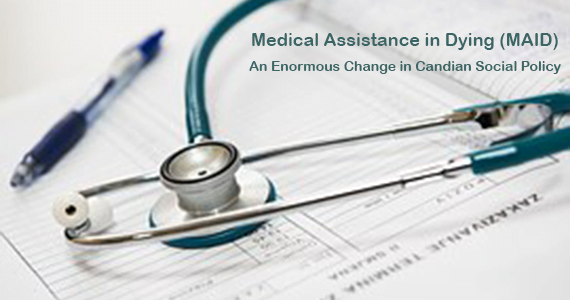
Recently Ruth chatted with an elderly friend (80s rather than 60s!) who is a smart, funny, relentlessly positive person. She's experienced some family ups and downs though, including the failing health of a brother. As a result of this decline and the resulting depression he has been pursuing Medical Assistance in Dying, or MAID. In conversation Ruth heard that death as a result of his condition is not imminent, nor is he in physical pain. His emotional pain is considerable and he just doesn't want to live any longer.
My response on hearing about this sad situation is that it's unlikely that the interviews he's awaiting will result in the outcome he's seeking. The legislation is cautious about those seeking MAID because of mental distress, and restricts the assistance for those who are no longer able to make their own decisions because of dementia.
The concerns that many of us have shared include our society's inability to address loneliness and depression for the elderly. I've written in the past about doing a project on euthanasia during my seminary training more than 40 years ago. An Anglican study concluded that many persons claiming they want to die had come to the conclusion that they were worthless or unloved.
While I no longer share the hard boundaries around MAID I'm waiting to hear about the redoubled commitment to palliative care and supports for the elderly in this country which would supposedly complement the MAID legislation. As a Christian who was a pastor by vocation I feel that every congregation should provide opportunities to talk through these issues at least yearly, and open them to interested folk from the broader community.
In case you're wondering, here are the current criteria for MAID. I'm interested in your thoughts.
Who is eligible for MAID under Canadian law?
Under Bill C-14, two independent health care professionals need to evaluate an individual in order to determine whether he/she qualifies for MAID. To qualify for MAID, a person must satisfy all of the following eligibility criteria. They must:
- Be eligible for government-funded health insurance in Canada;
- Be 18 years of age or older;
- Have a grievous and irremediable condition, as defined by Section 241.2, para. 2 of the Criminal Code;
- Have made a voluntary request for MAID that was not made as a result of external pressure;
- Give informed consent to receive MAID after having been informed of the means that are available to relieve their suffering, including palliative care.
In order to have a “grievous and irremediable medical condition,” as defined by Bill C-14, a person must satisfy all of the following requirements:
- Have a serious and incurable illness, disease, or disability;
- Be in an advanced state of irreversible decline in capability;
- Endure physical and psychological suffering that is intolerable to them; and
- Their natural death has become reasonably foreseeable.
Patients must also be capable of providing informed consent at the time that MAID is provided.
1 comment:
A discussion session with good information would be very helpful for Christians today.
Post a Comment